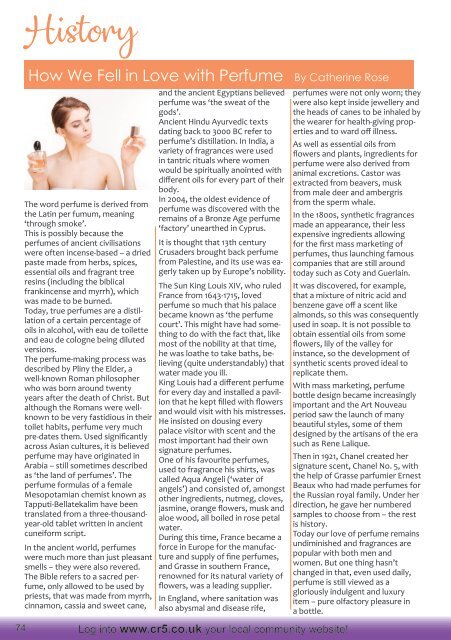CR5 Issue 157 June 2018
A local community magazine containing local business advertising along with interesting reads, puzzles and What's On in the local area
A local community magazine containing local business advertising along with interesting reads, puzzles and What's On in the local area
Create successful ePaper yourself
Turn your PDF publications into a flip-book with our unique Google optimized e-Paper software.
History<br />
How We Fell in Love with Perfume By Catherine Rose<br />
The word perfume is derived from<br />
the Latin per fumum, meaning<br />
‘through smoke’.<br />
This is possibly because the<br />
perfumes of ancient civilisations<br />
were often incense-based – a dried<br />
paste made from herbs, spices,<br />
essential oils and fragrant tree<br />
resins (including the biblical<br />
frankincense and myrrh), which<br />
was made to be burned.<br />
Today, true perfumes are a distillation<br />
of a certain percentage of<br />
oils in alcohol, with eau de toilette<br />
and eau de cologne being diluted<br />
versions.<br />
The perfume-making process was<br />
described by Pliny the Elder, a<br />
well-known Roman philosopher<br />
who was born around twenty<br />
years after the death of Christ. But<br />
although the Romans were wellknown<br />
to be very fastidious in their<br />
toilet habits, perfume very much<br />
pre-dates them. Used significantly<br />
across Asian cultures, it is believed<br />
perfume may have originated in<br />
Arabia – still sometimes described<br />
as ‘the land of perfumes’. The<br />
perfume formulas of a female<br />
Mesopotamian chemist known as<br />
Tapputi-Bellatekalim have been<br />
translated from a three-thousandyear-old<br />
tablet written in ancient<br />
cuneiform script.<br />
In the ancient world, perfumes<br />
were much more than just pleasant<br />
smells – they were also revered.<br />
The Bible refers to a sacred perfume,<br />
only allowed to be used by<br />
priests, that was made from myrrh,<br />
cinnamon, cassia and sweet cane,<br />
and the ancient Egyptians believed<br />
perfume was ‘the sweat of the<br />
gods’.<br />
Ancient Hindu Ayurvedic texts<br />
dating back to 3000 BC refer to<br />
perfume’s distillation. In India, a<br />
variety of fragrances were used<br />
in tantric rituals where women<br />
would be spiritually anointed with<br />
different oils for every part of their<br />
body.<br />
In 2004, the oldest evidence of<br />
perfume was discovered with the<br />
remains of a Bronze Age perfume<br />
‘factory’ unearthed in Cyprus.<br />
It is thought that 13th century<br />
Crusaders brought back perfume<br />
from Palestine, and its use was eagerly<br />
taken up by Europe’s nobility.<br />
The Sun King Louis XIV, who ruled<br />
France from 1643-1715, loved<br />
perfume so much that his palace<br />
became known as ‘the perfume<br />
court’. This might have had something<br />
to do with the fact that, like<br />
most of the nobility at that time,<br />
he was loathe to take baths, believing<br />
(quite understandably) that<br />
water made you ill.<br />
King Louis had a different perfume<br />
for every day and installed a pavilion<br />
that he kept filled with flowers<br />
and would visit with his mistresses.<br />
He insisted on dousing every<br />
palace visitor with scent and the<br />
most important had their own<br />
signature perfumes.<br />
One of his favourite perfumes,<br />
used to fragrance his shirts, was<br />
called Aqua Angeli (‘water of<br />
angels’) and consisted of, amongst<br />
other ingredients, nutmeg, cloves,<br />
jasmine, orange flowers, musk and<br />
aloe wood, all boiled in rose petal<br />
water.<br />
During this time, France became a<br />
force in Europe for the manufacture<br />
and supply of fine perfumes,<br />
and Grasse in southern France,<br />
renowned for its natural variety of<br />
flowers, was a leading supplier.<br />
In England, where sanitation was<br />
also abysmal and disease rife,<br />
74 Log into www.cr5.co.uk your local community website!<br />
perfumes were not only worn; they<br />
were also kept inside jewellery and<br />
the heads of canes to be inhaled by<br />
the wearer for health-giving properties<br />
and to ward off illness.<br />
As well as essential oils from<br />
flowers and plants, ingredients for<br />
perfume were also derived from<br />
animal excretions. Castor was<br />
extracted from beavers, musk<br />
from male deer and ambergris<br />
from the sperm whale.<br />
In the 1800s, synthetic fragrances<br />
made an appearance, their less<br />
expensive ingredients allowing<br />
for the first mass marketing of<br />
perfumes, thus launching famous<br />
companies that are still around<br />
today such as Coty and Guerlain.<br />
It was discovered, for example,<br />
that a mixture of nitric acid and<br />
benzene gave off a scent like<br />
almonds, so this was consequently<br />
used in soap. It is not possible to<br />
obtain essential oils from some<br />
flowers, lily of the valley for<br />
instance, so the development of<br />
synthetic scents proved ideal to<br />
replicate them.<br />
With mass marketing, perfume<br />
bottle design became increasingly<br />
important and the Art Nouveau<br />
period saw the launch of many<br />
beautiful styles, some of them<br />
designed by the artisans of the era<br />
such as Rene Lalique.<br />
Then in 1921, Chanel created her<br />
signature scent, Chanel No. 5, with<br />
the help of Grasse parfumier Ernest<br />
Beaux who had made perfumes for<br />
the Russian royal family. Under her<br />
direction, he gave her numbered<br />
samples to choose from – the rest<br />
is history.<br />
Today our love of perfume remains<br />
undiminished and fragrances are<br />
popular with both men and<br />
women. But one thing hasn’t<br />
changed in that, even used daily,<br />
perfume is still viewed as a<br />
gloriously indulgent and luxury<br />
item – pure olfactory pleasure in<br />
a bottle.

















